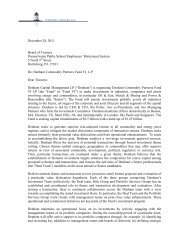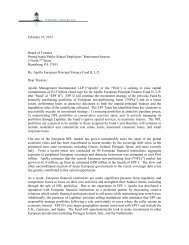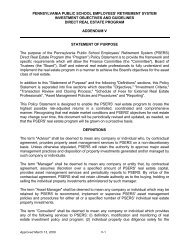PSERS OPPORTUNISTIC REAL ESTATE PROGRAM ...
PSERS OPPORTUNISTIC REAL ESTATE PROGRAM ...
PSERS OPPORTUNISTIC REAL ESTATE PROGRAM ...
You also want an ePaper? Increase the reach of your titles
YUMPU automatically turns print PDFs into web optimized ePapers that Google loves.
Major Real Estate Asset Classes. Apollo currently invests primarily in the major<br />
property types including retail, office and warehouse/light industrial and, to a lesser extent,<br />
residential and hospitality. Although, some of the prior funds made selective investments<br />
in real estate related operating companies, the International Fund and the European Fund<br />
II have de-emphasized such investments.<br />
“Off-Market” Transactions. Apollo concentrates on “off-market” transactions and rarely<br />
participates in widely marketed auctions, in which competition is intense and the potential<br />
for large due diligence costs squandered on unsuccessful transactions is high. Apollo<br />
typically sources transactions in conjunction with its local operating partners from<br />
motivated sellers who wish to conduct one-on-one negotiations, or who are contacting a<br />
small number of select, qualified buyers able to conclude transactions quickly.<br />
Proven Joint Venture Partners with Local Expertise. Generally, Apollo undertakes its<br />
investments with experienced joint venture partners. These local operators are extremely<br />
important in originating off-market transactions and performing day-to-day asset<br />
management responsibilities. These partners typically invest between 5% and 50% of the<br />
total equity requirement for each investment and provide asset management services<br />
pursuant to a pre-agreed business plan. Generally, partnership meetings are conducted<br />
every month, and Apollo has significant input to the operation of the assets. Ultimately,<br />
Apollo maintains approval rights over all major decisions and has the power to remove<br />
joint venture partners in the event of non-performance. A description of some of Apollo’s<br />
selected local partners and an overview of the nature of their co-investing relationship with<br />
Apollo can be found later in this section.<br />
Major Markets. Apollo intends to continue to focus on the major European markets of the<br />
UK, France, Germany and Spain and the principal cities of smaller markets such as<br />
Warsaw, Prague, Bucharest and Budapest. Apollo concentrates on investing in the major<br />
European markets but has increasingly begun to identify attractive opportunities in<br />
Eastern Europe which are often focused on development or regeneration opportunities.<br />
Over 41% of Apollo’s European investments (measured by equity commitments) have<br />
been in the UK, Europe’s largest real estate market in terms of capitalization. The<br />
remaining investments have been predominantly in the major European economies,<br />
including Germany, France and Spain. Given the weight of money acquiring income<br />
producing assets in the UK, the European Fund II has reduced its UK exposure in favor of<br />
other markets such as Germany and Switzerland. In addition, Apollo intends to target<br />
selected investments in Central and Eastern European countries recently admitted into<br />
the EU (including Poland, Bulgaria, Romania, the Czech Republic and Hungary). Apollo<br />
concentrates on these markets, in part, because they provide the most liquidity upon exit.<br />
Apollo also anticipates undertaking selected investments on a limited basis in non-EU<br />
countries such as Russia, Turkey, and the Ukraine.<br />
Medium-Sized Investments. Apollo generally makes medium-sized real estate<br />
investments. The average equity invested in each of the 93 European investments in the<br />
prior funds is approximately $15 million. No single investment in the European Fund II, to<br />
date, has represented more than 6% of the total fund size. By targeting mid-sized equity<br />
investments, Apollo is able to participate in a broad section of the investment market.<br />
Risk Aversion. In addition to diversification, Apollo further seeks to reduce risk in its<br />
portfolio by focusing primarily on income-producing assets where value can be created by<br />
filling vacancies, extending lease terms, increasing rents and selectively adding value<br />
through capital improvements and expansions. Historically, Apollo’s European<br />
investments have been allocated 64% to income producing assets and 36% to<br />
<strong>PSERS</strong> Private Investments<br />
Page 4 of 8
















